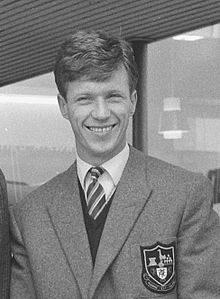John White (footballer, born 1937)
 |
|||
| Personal information | |||
|---|---|---|---|
| Full name | John Anderson White | ||
| Date of birth | 28 April 1937 | ||
| Place of birth | Musselburgh, Midlothian, Scotland | ||
| Date of death | 21 July 1964 (aged 27) | ||
| Place of death | Crews Hill, Middlesex, England | ||
| Playing position | Inside forward | ||
| Senior career* | |||
| Years | Team | Apps | (Gls) |
| 1955–1958 | Alloa Athletic | 68 | (26) |
| 1958–1959 | Falkirk | 30 | (8) |
| 1959–1964 | Tottenham Hotspur | 183 | (40) |
| National team | |||
| 1959 | Scottish League XI | 2 | (2) |
| 1959–1964 | Scotland | 22 | (3) |
| * Senior club appearances and goals counted for the domestic league only. |
|||
John Anderson White (28 April 1937 – 21 July 1964) was a Scottish international football midfielder and sometime inside right who played a significant role for Tottenham Hotspur (Spurs) during their Double winning season in 1960-61. He had two brothers, Edwin and Tom, who were also professional footballers. John White was killed by lightning at the age of 27.
White had originally played for Alloa Athletic under the management of Jasper ‘Jerry’ Kerr (the John White Lounge is still a feature at the Clackmannanshire club's ground) before being sold onto Falkirk, where he played alongside Dougie Moran, but his lasting fame was assured when Tottenham manager Bill Nicholson took him to London for £22,000 in October 1959. White’s frail appearance had been the cause of considerable concern resulting in a number of English First Division clubs choosing not to risk the investment but following the reviews received from Danny Blanchflower and Dave Mackay (who had played in internationals alongside him) and information received from the Army that White was a celebrated cross-country runner, Nicholson decided to make good his interest.
At Spurs White initially occupied the inside-left position, having been bought by Nicholson to replace Dave Dunmore, but his talent flourished as an inside right as a replacement to Tommy Harmer. White’s worth to the team could be calculated in terms of goals scored (between 1959 and the conclusion of the Double winning season (a season in which he was ever-present) he contributed 18 goals) but his success mainly lay in a combination of skills: his passing, his ball control which helped sustain the attacking momentum but so too his runs to find space off the ball, arriving unexpectedly in the opposition’s penalty area which resulted in the White Hart Lane faithful giving him the nickname "The Ghost". With him Tottenham never finished worse than 4th in the First Division and in the 15 matches missed by White while on their books, Tottenham won only once.
...
Wikipedia
